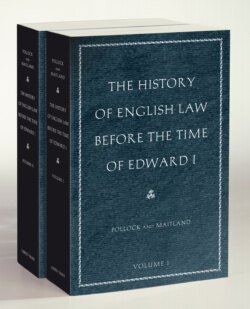Читать книгу The History of English Law before the Time of Edward I - Frederic William Maitland - Страница 10
На сайте Литреса книга снята с продажи.
ОглавлениеAdditions and Corrections
p. 38, middle of page. As to the burh-geat (not burh-geat-setl) see W. H. Stevenson, E. H. R. xii. 489; Maitland, Township and Borough, 209.
p. 126. Dr. Liebermann has withdrawn the suggestion that Vacarius was the author of the tract on Lombard law. See E. H. R. vol. xiii. p. 297. The Summa de Matrimonio has been printed in L. Q. R. xiii. 133, 270.
p. 585, note 91. Add a reference to J. H. Round, The Hundred and the Geld, E. H. R. x. 732.
p. 698. As causes of municipal expenditure we ought to have mentioned the many presents, of a more or less voluntary kind, made by the burgesses to kings, magnates, sheriffs and their underlings. For these see the Records of Leicester, ed. Bateson, passim.
p. 156. As to the ownership and possession of movables, the articles by Mr. J. B. Ames in Harv. L. R. vol. xi. pp. 277 ff. should be consulted.
p. 377, note 393. As to the forfeiture of the goods of a man who dies desperate, see Art. 30 of the Preston Custumal (Harland, Mamecestre, vol. iii. p. xxxviii).
p. 380, note 403. Add a reference to Records of Leicester, p. 219. In 1293 the burgesses decide that the heir is to have the best cauldron, the best pot and so forth. In Scotland the “heirship movables” were of considerable importance. In the seventeenth century the heir would take, among other things, “the great House Bible, a Psalm-book, the Acts of Parliament.” See Hope’s Minor Practicks, ed. 1734, p. 538.
p. 390, note 27. An interesting historical account of the Scottish law of marriage by Mr. F. P. Walker will be found in Green’s Encyclopædia of the Law of Scotland. Pre-Tridentine catholicism seems to find its best modern representative in this protestant kingdom.
p. 509, note 140, and p. 666, note 376. The Annals of Winchester, p. 25, and Thomas Wykes, p. 235, differ about the number of the compurgators, which may have been 25 or 50.
p. 523, side-note, should read “Treason contrasted with felony.”
p. 562, note 400. So the burgess of Preston who has charged a married woman with unchastity must proclaim himself a liar holding his nose with his fingers: Harland, Mamecestre, vol. iii. p. xl.
